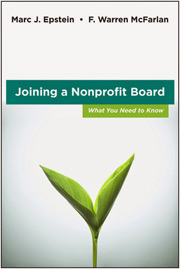Joining a Nonprofit Board: What You Need to Know is like one of those Lonely Planet travel guides, introducing board members to alien cultures and exotic customs. Written as a help for business people, the book translates the vocabulary and customs of nonprofits for people more accustomed to Wall Street or Main Street. The board members of theological schools, which are nonprofit organizations with extra ingredients like shared governance and church connections, can learn much from its confident advice.
 |
| Joining a Nonprofit Board: What You Need to Know by Marc J. Epstein and F. Warren McFarlan (Jossey-Bass, 2011, 202 pp., $40.) |
Marc J. Epstein says he and F. Warren McFarlan — professors of business at Rice and Harvard respectively — wrote the book to serve the growing number of graduates from their programs who were eventually asked to serve charitable boards.
“My coauthor and I teach MBA students. As they get more mature in their careers, they start to join nonprofit boards. It is a foreign land for many of them,” says Epstein. But the book can serve as a primer for anyone on the board of a school or charity, not just business people — even a seminary’s employees might benefit from its clear case studies demonstrating how nonprofits work and how they differ from the for-profit world.
Most fundamentally, the book explains “mission,” and how the mission of a charitable organization differs from that of a business. Then it moves on to performance measurement, financial strategies, and the nature of philanthropy and how it works (including insights about “the ask” that are themselves worth the price of the book). Board structure, chairmanship, and even a guide to deciding whether you should accept an invitation to join a board are all covered.
One of the most practical pieces of advice comes early on, when the authors suggest new board members stay quiet and learn for the first year of their service. This book would be a helpful part of any orientation package for new board members — especially business people navigating their way into higher education governance for the first time.
The safari guide speaks
An interview with Marc J. Epstein, coauthor of Joining a Nonprofit Board. Epstein is Distinguished Research Professor of Management at Jones Graduate School of Business at Rice University in Houston.
How would a board of a theological school attract excellent business minds—the people you have written this book for?
For any nonprofit, it’s a matter of commitment: “Are we getting people who are firstly committed to the organization?” But on for-profit boards, we’re all pretty clear about what we’re trying to achieve—it’s typically about making more money.
Nonprofits and foundations are more complex. We should be focused on our mission. You might think this is straightforward, but it seldom is. I've worked with faith-based nonprofits, and what I've found is a lack of clarity. Once you address that, then you can talk about getting business folks on your board. Otherwise you get business folks who may have different views of what the mission is.
It really does seem like the two worlds are so different.
Absolutely. The business person understands the role of a corporate CEO, who can direct a large staff to do what he or she wants them to do; they are employees. But if that CEO sits on a board of volunteers; they don’t have the same incentives or responsibilities as employees.
What do nonprofits typically do wrong with business people they recruit?
Wise nonprofits shouldn't think, “I’m going to take this successful business person, and bring him on to this board, and this is going to be great.”
Where the role of a board member involves fundraising, that needs to be specifically said, up front. Often it is not. Too often, we want a wealthy person on the board, thinking they will donate a reasonable amount of money.
Do charitable boards lose good business minds by not doing this right?
Sometimes they lose them. Sometimes they frustrate them. And sometimes the board is frustrated! They hear an executive talking about what the nonprofit “should” do. Perhaps this person cares deeply about religion, and perhaps he or she has been in business for 20 years. They join the board but don’t know anything about teaching theology. They start to impose their thoughts. The people who have been doing this for years say, “We don’t need your help with that; we need your help raising money.” When we recruit board members, we need to be specific about expectations.